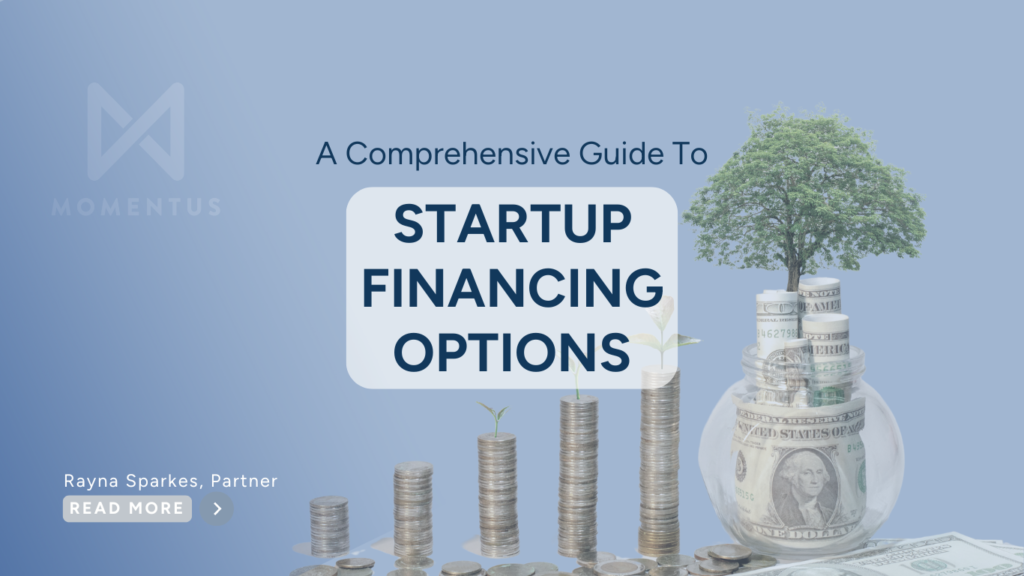Navigating the landscape of startup financing is crucial for founders who want to scale their businesses effectively. Finding the type of financing that is the best fit for your company’s current growth plan can provide the necessary capital for your company. Each type of financing option will have benefits but also drawbacks that can complicate your operations. In this comprehensive guide, we’ll explore various financing options, including Venture Capital Financing, Investments from Angels, Crowdfunding, Grants and Competitions, SAFEs, Convertible Notes, and Bank Loans and Credit Lines.
Whether you’re a first-time founder or an experienced entrepreneur, understanding these options can help you make informed decisions that align with your startup’s goals and growth trajectory.
1. Venture Capital (“VC”) Financing: The Fuel for High-Growth Startups
What is VC Financing?
VC financing is a form of private equity financing that is provided by venture capital firms to companies with high growth potential. These firms provide investment in exchange for equity, meaning they take an ownership stake in your company.
How VC Financing Works:
Venture Capital firms typically invest in startups at various stages of development. The initial round, often referred to as Seed funding or can be Pre-Seed funding, helps to launch a company’s primary business plan. As the company grows, it may receive additional rounds of funding, such as Series A, B, C, and beyond. Each round involves selling a portion of equity to the investors.
VC investors don’t just provide funding; they also offer strategic guidance, mentorship, and access to their networks. This can be incredibly valuable for startups looking to scale rapidly. However, VC investors are interested in a high return on their investment so they will often support exit strategies such as an Initial Public Offering (“IPO”) or acquisition.
Advantages of Venture Capital:
- Significant Funding: VC firms can provide substantial capital, often in the millions, which can be used to fuel rapid growth, expand operations, and scale your business.
- Expertise and Networking: VCs bring industry expertise, strategic advice, and valuable connections that can help you navigate challenges and seize opportunities.
Challenges of Venture Capital:
- Equity Dilution: Every round of VC funding reduces your ownership stake in the company. This dilution can also affect your control over business decisions.
- Incentive to Scale: VCs typically support rapid growth and may push for strategies that prioritize the best return on their investment which in certain markets may be difficult.
- Exit Expectations: VCs are looking for a significant return on their investment, which often means planning for an exit strategy that may create pressure on the founders and executives to support these strategies.
Is VC Financing Right for Your Startup?
VC financing is ideal for startups with high growth potential, a scalable business model, and the ambition to become industry leaders. If your company fits this profile and you’re ready to trade equity for the resources and expertise that can propel you forward, VC financing might be the right path for you.
2. Investments from Angel Investors: Personalized Support from Experienced Investors
What are Angels?
Angels are high-net-worth individuals, known as angel investors (“Angels”), who provide capital to startups, typically in exchange for equity, but can also be in the form of convertible notes or SAFEs (discussed below). Unlike funding from VC firms, angel investors use their own money and often invest in the early stages of a startup’s life cycle.
How Investments from Angels Works:
Angels usually come in during the pre-seed, seed and early stages of a startup when the company is still developing its product or service and may not yet have significant revenue. In equity financings with Angels, they will provide their investment in exchange for equity in the company, which means they own a portion of the business.
Many Angels are experienced entrepreneurs or VC investors themselves, and they often provide more than just capital. They can offer mentorship, advice, and access to their personal networks, helping you navigate the challenges of growing a business.
Advantages of Angel Investing:
- Early-Stage Funding: Angels are often willing to invest at the very early stages when other forms of financing might not be available. This can provide the crucial seed money needed to develop your product or service.
- Flexible Terms: Angels may offer more flexible terms compared to venture capitalists, with less emphasis on immediate returns and more focus on long-term growth.
- Mentorship and Guidance: Many Angels take an active role in the companies they invest in, offering valuable mentorship, industry insights, and introductions to other potential investors or partners.
Challenges of Angel Investing:
- Limited Capital: While Angels can provide significant funding, it’s often less than what you might receive from a VC firm. This means you may need to seek additional rounds of financing as your company grows.
- Equity Dilution: Like venture capital, equity financing from Angels involves diluting your equity. Rarely, this can also include a portion of control in the company.
- Involvement: Some Angels might want to be actively involved in your business decisions, which could lead to potential conflicts if their vision doesn’t align with yours.
Is Receiving Investment from Angels Right for Your Startup?
Investment from Angels is a great option for startups that need early-stage capital and value personalized support from experienced investors. If you’re looking for funding to develop your product or service and would benefit from mentorship and guidance, investment from Angels could be the perfect fit.
3. Crowdfunding: Harnessing the Power of the Crowd
What is Crowdfunding?
Crowdfunding is a method of raising capital by soliciting small investments or contributions from a large number of people, typically via online platforms (“Crowdfunding”). This approach allows startups to bypass traditional financing methods and engage directly with their potential customers or supporters.
Types of Crowdfunding. There are many types of crowdfunding, here are a some to know about:
- Reward-Based Crowdfunding: Backers contribute money in exchange for rewards, such as early access to a product, exclusive merchandise, or other perks. Platforms like Kickstarter and Indiegogo are popular for this type of crowdfunding.
- Equity-Based Crowdfunding: Investors contribute money in exchange for equity in the company. Unlike reward-based crowdfunding, equity crowdfunding involves selling shares of your company to backers, making them part owners. Platforms like SeedInvest and Crowdcube specialize in equity crowdfunding.
- Debt-Based Crowdfunding: This is a type of lending from crowd investors. Like traditional loans, these are typically repaid with interest over a specified amount of time. Prosper and Funding circle use peer to peer lending for debt based crowdfunding.
- Donation-Based Crowdfunding: Typically used for charitable causes, this type involves donors giving money without expecting anything in return. GoFundMe is a well-known platform for donation-based crowdfunding.
How Crowdfunding Works:
To launch a crowdfunding campaign, you’ll need to create a compelling pitch that resonates with potential backers. This usually includes a detailed description of your project, a clear funding goal, and a range of rewards or equity offerings. Successful campaigns often require significant marketing efforts, including social media promotion, email marketing, and PR to drive traffic to your crowdfunding page.
Advantages of Crowdfunding:
- Market Validation: Crowdfunding allows you to validate your product or business idea with real customers before fully committing to its development. A successful campaign can demonstrate market demand and provide valuable feedback.
- Engaged Community: Crowdfunding builds a community of supporters who are emotionally and financially invested in your success. These early adopters can become brand advocates, helping to spread the word about your product or service.
- Flexible Funding: Depending on the platform and type of crowdfunding, you may be able to choose between fixed or flexible funding models. Fixed funding requires you to meet your funding goal to receive any money, while flexible funding allows you to keep whatever you raise, even if you don’t reach your target.
Challenges of Crowdfunding:
- Time-Consuming: Running a successful crowdfunding campaign requires careful planning, a compelling narrative, and ongoing engagement with backers. This can be time-consuming and may distract from other business activities.
- Uncertain Outcomes: Crowdfunding is not guaranteed—if your campaign doesn’t resonate with potential backers, you may not reach your funding goal. In some cases, this could mean receiving no funds at all.
- Public Exposure: Crowdfunding campaigns are public, meaning your idea is out in the open. While this can help attract support, it also means that competitors can see and potentially copy your idea.
Is Crowdfunding Right for Your Startup?
Crowdfunding is an excellent option for startups with a compelling product or service that resonates with a broad audience. It’s particularly suited for consumer-facing businesses where early customer engagement can drive long-term success. If you’re prepared to invest time in marketing and community building, crowdfunding could provide both the capital and the validation you need to move forward.
4. Grants and Competitions: Securing Non-Dilutive Funding
What are Grants and Competitions?
Grants and competitions offer non-dilutive funding opportunities, meaning you can receive capital without giving up equity or incurring debt. These funds are often provided by government agencies, non-profits, or through business competitions that aim to foster innovation, research, and entrepreneurship.
How Grants and Competitions Work:
Grants are typically awarded based on the merit of your proposal, which may focus on specific research areas, technological innovations, or social impact initiatives. Competitions, on the other hand, involve pitching your business idea to a panel of judges, with winners receiving cash prizes, mentorship, or other resources.
The application process for grants can be rigorous, requiring a well-thought-out proposal, budget, and alignment with the grant provider’s objectives. Competitions may involve multiple rounds of pitching, where you’ll need to present your business plan, market opportunity, and growth strategy.
Advantages of Grants and Competitions:
- Non-Dilutive Funding: Grants and competition prizes do not require you to give up equity, meaning you can access capital without diluting your ownership stake or taking on debt.
- Validation and Credibility: Winning a grant or competition can provide validation for your business idea, adding credibility and helping you attract further investment or customers.
- Targeted Support: Many grants and competitions are industry-specific, offering targeted support to businesses working on particular technologies, social issues, or market sectors.
Challenges of Grants and Competitions:
- Highly Competitive: Both grants and competitions are highly competitive, with many applicants vying for limited funding. The application or pitching process can be time-consuming and require significant preparation.
- Restricted Use of Funds: Some grants come with restrictions on how the funds can be used, limiting their flexibility. It’s important to thoroughly understand the terms and ensure that they align with your business needs.
- Time-Consuming: The process of applying for grants or participating in competitions can be lengthy and may divert your attention from other business activities. However, the potential rewards often justify the effort.
Is Grant Funding or Competitions Right for Your Startup?
Grants and competitions are ideal for startups that align with specific funding criteria and are willing to invest time in the application process. If your business is working on innovative technology, social impact initiatives, or research and development, pursuing these non-dilutive funding opportunities could be highly beneficial.
5. Simple Agreement for Future Equity (“SAFE”) Financing: Simplified Financing for Early-Stage Companies
What is a SAFE?
A SAFE is a financial instrument (originally created by Y Combinator) that allows investors to provide capital to companies in exchange for the right to obtain equity upon a specified event. They are designed to simplify the investment process and make raising capital easier without having to go into the details of a traditional equity financing.
How a SAFE Works:
SAFEs are a way for investors to invest in a company in exchange for the right to receive equity in the future. The conversion into equity happens during certain triggering events, such as a priced funding round, IPO or sale of the company. Unlike debt financing options, there is no interest accruing so these tend to be a more founder-friendly option. However, it still allows investors to benefit from the upside potential of your company’s future growth.
Advantages of SAFEs:
- Founder-Friendly Terms and Simplicity: With no interest or maturity date, SAFEs are less burdensome than debt financing and offer a more straightforward way to raise capital than traditional equity financing.
- Investor Attraction: The potential for high returns in exchange or early investment makes SAFEs appealing to investors. Features like valuation caps, discounts and Most Favored Nation clauses can enhance the value of their investment when the SAFEs convert.
- Fast Funding Process: Because of their simplicity, SAFEs can facilitate faster fundraising compared to traditional equity financing, allowing startups to secure capital quickly.
Challenges of SAFEs:
- Valuation Cap: While SAFEs can include a valuation cap that provide investors a maximum valuation at which the SAFE converts into equity thereby protecting them from disultion in the startup’s valuation increases, this will dilute the other holders. Valuation caps can also be used to determine the current round of a priced financing depending on how recent a SAFE with a valuation cap was last included.
- No Immediate Ownership: Investors do not receive shares or voting rights until the SAFE converts into equity. SAFEs also have uncertainty regarding the time of conversion, especially if the startup is unsure when or if their company needs additional investment.
Is SAFE Financing Right for Your Startup?
SAFEs are an excellent option for startups that want to defer having a full equity financing in the early stages of their startup. Startups with tech focus, high growth potential or those that anticipate future rounds of financing will attract investors willing to provide capital investment through SAFEs.
6. Convertible Note Financing: A Short Term Loan
What is a Convertible Note?
A Convertible Note is a short-term debt instrument used by companies to raise capital (“Convertible Note”). It allows investors to loan money to a company with the option to convert the debt into equity in the future.
How Convertible Note Financing Works:
Convertible Notes can be used as a form of financing for your company (“Convertible Note Financing”). Convertible Notes are a debt instrument that includes a principal amount, an interest rate and a maturity date by which the note must be converted or repaid. The Convertible Note will convert into equity upon a triggering event such as a priced funding round, IPO or merger or acquisition. Convertible Notes may also have valuation caps or discount rates at which the note will convert into equity.
One of the key features of Convertible Notes is accrued interest, which can either be paid back in cash or added to the principal amount when the note converts into equity. Additionally, Convertible Notes will include a maturity date that provides a set date the company is required to repay or convert the Convertible Note.
Convertible notes also sometimes include warrants, which is an additional instrument that are similar to stock options, giving the holder the right to purchase company stock in the future.
Advantages of Convertible Notes:
- No Immediate Valuation Needed: Convertible Notes allows you the option to raise funds without the immediate need to determine a company valuation, which can be advantageous during the early stages of your business when valuations are often uncertain. However, valuation caps can be used in future financings to help determine the company’s valuation during a priced round.
- Investor Attraction: Convertible Notes often include features that provide early investors with potential upside upon conversion, such as valuation caps, discounts, and accrued interest.
- No Immediate Repayment: Startups do not need to make immediate repayments for these loans, since these will not convert until a specified event occurs so there’s no imminent pressure like traditional loans.
Challenges of Convertible Notes:
- Debt Obligation: Convertible Notes are debt instruments that carry an obligation to repay the principal and any accrued interest by the maturity date if conversion does not occur.
- Complex Terms: Although generally simpler than traditional equity financing, Convertible Notes can still involve complex terms that may lead to misunderstandings or disputes between investors and founders.
Is Convertible Note Financing Right for Your Startup?
Convertible Note Financing is an excellent option for startups that are in the early-stage or potential for high growth. It is particularly suitable for companies that have a likelihood of future funding needs but would like to approach initial funding with the most simplicity. Convertible Notes are investor friendly so investors are more likely to choose convertible notes over other convertible instruments.
7. Bank Loans and Credit Lines: Traditional Financing for Startups
What are Bank Loans and Credit Lines?
Bank loans and credit lines are traditional financing options that allow startups to borrow money from financial institutions. Unlike equity financing, these are debt instruments, meaning they must be repaid with interest over a specified period.
How Bank Loans and Credit Lines Work:
Bank loans involve borrowing a fixed amount of money that you repay over time with interest. The terms of the loan, including the interest rate, repayment schedule, and collateral requirements, are determined by the bank based on your creditworthiness and having had multiple years in business.
Credit lines are similar to traditional bank loans, but provide a more flexible form of financing. They allow you to borrow up to a certain limit, repay, and borrow again as needed and may be unsecured forms of credit. This revolving credit can be particularly useful for managing cash flow, covering operational expenses, or financing short-term projects, however, are smaller than bank loans.
Advantages of Bank Loans and Credit Lines:
- No Equity Dilution: Since bank loans and credit lines are forms of debt, they don’t require you to give up equity in your company, allowing you to retain full ownership and control.
- Predictable Repayment: Fixed-term loans offer predictable repayment schedules, making it easier to manage your finances and plan for the future.
- Access to Capital: Bank loans can provide substantial amounts of capital, which can be used to finance large projects, expand operations, or purchase equipment.
Challenges of Bank Loans and Credit Lines:
- Collateral Requirements: Banks often require collateral to secure the loan and sometimes credit lines, which can be challenging for startups that don’t have significant assets. In some cases, founders may need to provide personal guarantees.
- Strict Qualification Criteria: Banks are typically conservative in their lending practices, meaning they may only lend to startups with strong credit histories, proven revenue, and a solid business plan. This can make it difficult for early-stage companies to qualify.
- Repayment Obligations: Unlike equity financing, debt must be repaid regardless of your company’s performance. This means you’ll need to ensure consistent cash flow to meet your repayment obligations.
Is Bank Financing Right for Your Startup?
Bank loans and credit lines are suitable for more established startups with a solid credit history and consistent revenue. If your business can meet the bank’s qualification criteria and you prefer to retain full ownership without diluting equity, traditional bank financing could be a viable option.
Conclusion: Navigating Your Startup’s Financing Options
Choosing the best financing option for your startup is a critical decision that will impact your company’s growth, ownership structure, and long-term success. Each option—whether it’s Venture Capital Financing, Investment from Angels, Crowdfunding, Grants and Competitions, SAFEs, Convertible Notes, or Bank Loans and Credit Lines —has its own set of advantages and challenges.
At Momentus Legal, we’re here to help you navigate these complex decisions. Our team of experienced attorneys can provide the legal support you need to secure the right financing for your business, structure agreements that protect your interests, and ensure compliance with all relevant regulations.
If you’re ready to explore your financing options further or have any questions about the best path forward for your startup, don’t hesitate to contact us. We’re here to help you build a solid foundation for your company’s future success.
Contact Rayna Sparkes, Partner at Momentus Legal
- Email: rayna.sparkes@momentuslegal.com
- Phone: 541.221.8580
- Linkedin: @RaynaSparkes





